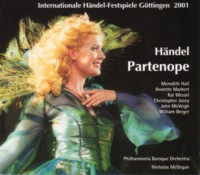First performed in February 1730, Partenope
is the second opera Handel composed for the “second” academy. The title
character Partenope is the mythological founder and first queen of Naples. She
is loved by three suitors, among whom is Arsace, who is already engaged to
Rosmira. Rosmira arrives disguised as a man (‘Eurimene’) and makes Arsace
promise not to reveal her identity. Thus the story is about love affairs and
based on provocations from Rosmira to Arsace and the dilemmas of both
Partenope and Arsace. The tone of Partenope is very light and offers
more comical situations than most other Handel operas. This anti-heroic opera
is a special work which belongs to a particularly versatile - perhaps even
experimental - period of creativity in Handel’s career.
This live recording was made at the 2001
Göttingen Festival, so the stage and audience noises are quite intrusive -
enough to make complete listening quite painful. But more importantly the
performance is really disappointing. The interpretation definitely respects
the style of the music and all the singers are particularly involved in their
characters - which is an advantage of the live recording. However, the singing
is sometimes particularly weak. Meredith Hall is a Partenope with a tensed
voice. The fast runs are not accurate and the high notes almost systematically
made “thanks” to throats tightening. I think we can assume that when Handel
writes high notes he writes them for a singer who can sing them without such
efforts. Both countertenors - Kai Wessel and Chris Josey - seem to have
problems in preventing the sound going backward in the throat, and thus create
problems of accuracy. Wessel has some (albeit few) nice moments that imply he
might have done much better: he is surprisingly at ease in the “Furibondo
spira il vento” at the end of act II. Rosmira’s part sometimes seems too low
for Annette Markert, but both her singing and interpretation are of a very
good standard and she is perhaps the most satisfying member of the cast. Tenor
John McVeigh is a vigorous and efficient Emilio, and William Berger deserves
no reproach in his one and only aria. Nicholas McGegan and his Philharmonia
Baroque Orchestra offer nice colors and an accurate accompaniment but it could
have been less neutral and more dramatically engaged. Tempi are often
quite slow and uniform.
Such productions should be encouraged, yet
this recording is not recommendable to listeners other than those looking for
a souvenir of the staged performances. Whether or not the singers are
uneasy because of the staging, this noisy recording offers little to those who
did not attend the performances (I belong to this category) and the general
audiophile will probably find it unacceptable. René Jacobs was not satisfying
as Arsace in Kuijken’s 1979 recording of Partenope, but this ‘old’ one
remains generally preferable to the new one available to members of the
Göttinger Händel-Gesellschaft. Sadly Partenope is definitely still
waiting for a good and well balanced recording.

© Philippe Gelinaud - January 2002

